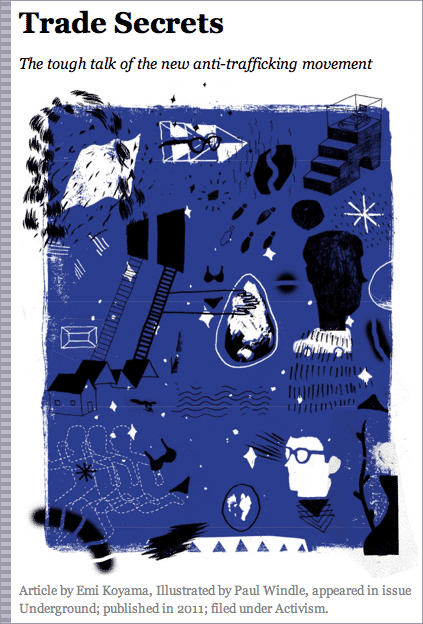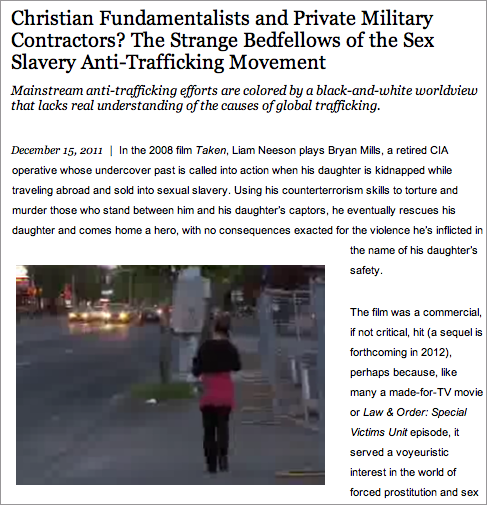A couple of days ago, leftist news site AlterNet.org re-published my Bitch magazine article about the anti-trafficking movement through some sort of syndication agreement between the two outlets (I’m sure), but with a twist: AlterNet has chosen to change the title, and to include a different image to go along with the article.
Here’s the Bitch version, which was published with the title “Trade Secrets: The tough talk of the new anti-trafficking movement” (which isn’t a particularly good title, but it’s not offensive in any way):

The AlterNet version looks like this, with the new, salacious title, “Christian Fundamentalists and Private Military Contractors? The Strange Bedfellows of the Sex Slavery Anti-Trafficking Movement”:

As the user antipropagandamachine points out,
Ironic that an article warning against sensationalizing rape slavery for partisan politicking should be renamed to front AlterNet’s #1 and #2 enemies, add the word “sex”, and toss in an unnecessarily salacious reference to “bedfellows.”
I would also add AlterNet’s decision to use a picture of a woman walking on the sidewalk taken from behind resembles just about every mainstream media outlet’s behavior when they publish stories about prostitution or sex trafficking. I’m so sick of this, as I am of the salacious expression chosen by AlterNet editors for the title. Oh well, at least the woman appears to be dressed warm.
In the meantime, the radical feminist blogger womononajourney left a comment dismissive of my work, characterizing my position as simply “in favor of decriminalizing or legalizing prostitution” and suggesting that I am working to preserve men’s access to women’s sexuality and “women’s rape-ability,” hence “women’s subordination.” She wrote:
I am not in favor of the military apparatus or racial profiling, but I have to notice that it is issues pertaining to women’s rape-ability that get this sort of attention. Could it be that since women’s sexuality is the ground zero of women’s subordination, this is the one area where men MUST keep access at all costs?
I find that most people who take this “hands off” stance on sex trafficking are really in favor of decriminalizing or legalizing prostitution, which if you check out Emi’s website, she is. It makes little sense to me to avoid taking an anti-prostitution stance just because the Christian Right also takes one. A feminist stance against prostitution is for entirely different reasons than a conservative christian one.
I posted a response to her, which goes like this:
For someone who claims to have read my blog, you seem to be conveniently neglecting that I have been publicly criticizing sex worker’s rights movement and its (feminist and non-feminist) supporters for their over-emphasis on promoting decriminalization and destigmatization of prostitution. In fact, I specifically wrote in this very article you are responding to that decriminalization/legalization of prostitution (or any other legal classification) is not the answer.
My perspective is that, while yes I do support decriminalization because I don’t think my friends and I deserve to be arrested and prosecuted for surviving and supporting families through sex trade (what feminist does?), I don’t think that this is the most important issue affecting people in the sex trade. I think that the privileging of decriminalization as a core demand of the sex workers’ movement and its allies reflects the interest of white middle-class sex workers and their clients, much like the over-emphasis on same-sex marriage reflects the interest of certain kind of queers over others, or on abortion rights reflects the interest of certain kind of women.
You may also find, if you are actually paying attention, that I only mentioned the term “sex work” or “sex worker” in the context of referring to the sex worker’s movement or sex work “controversy,” or in a quote. I intentionally avoided the term (instead using a more value-neutral “sex trade”) because I wanted to move away from the simplistic “is sex work oppressive violence or liberating choice?” debate, and talk substance about forces that harm women in the sex trade and how we are fighting back.
I find it disturbing that someone who claims to be a feminist and to have actually read my blog thinks that she can distort and dismiss another woman’s point of view, mislabeling it as simply “in favor of decriminalizing or legalizing prostitution” when I am explicitly criticizing that as a false emphasis. I wrote this article precisely because the sort of over-simplification and dumbing down of our conversations about sex trafficking and sex trade that your comment exemplifies harm women and others who are engaged in the sex trade.
Indeed, I actually pointed out in the article itself that rad-fem critics of the institution of prostitution are at odds with the Christian fundamentalists in the anti-trafficking movement, and argued that feminists of all persuasions have a chance to work together. It’s one thing if womononajourney disagreed with this sentiment, but she appears to be confirming what I wrote about the differences between radical feminist and Christian fundamentalist opposition to prostitution and sex trafficking, all the while accusing me of failing to recognize the difference.
12/20/2011 update
User womononajourney responded to my comment, once again trying to paint me as a pro-porn, pro-prostitution sex libertarian. My response to her is below:
I think this is important to make readers aware of since decriminalization and trafficking are interlinked.
You have no basis for this claim. No legal jurisdiction in which prostitution was decriminalized allow trafficking of women and others for the purpose of sexual exploitation, and in fact it reduces the ability of traffickers to control their victims and increases the victims’ ability to seek help.
So I was correct in asserting that you support decriminalization.
Are you saying that my friends and I deserve to be arrested and imprisoned for surviving and supporting our families through prostitution? I am shocked. I thought that radical feminists supported decriminalizing at least the selling of sex acts…
Furthermore, I do not endorse “hands off” approach which you associate with the decriminalization/legalization camp. I just don’t believe that the capitalist, patriarchal state with its prison and military industrial complexes has women’s best interest at heart. That does not mean that there isn’t a need for feminist intervention.
You point out correctly, as I also explained in the article, that feminist and fundamentalist Christian opposition to prostitution are not the same. Why is it so difficult for you to recognize also that feminist and libertarian support for decriminalization are different?
Have you not also started the Portland State University’s Porn Club? Let’s get real about your position in this debate, emi.
Indeed, I along with a couple of friends at Portland State University started Porn Club, whose goal was to appreciate and make feminist alternatives to the misogynistic and racist mainstream porn. What’s so scandalous about it?
How did you find out about Porn Club? We only met once or twice at a cafe to discuss what we wanted to do, and it fizzled away. As someone who had to deal with a stalker who followed me across the continent and showed up in front of my apartment, I find it creepy that you went back so far in my past to uncover something I had long forgotten about.
Why do you continue to rely on ad hominem attack on me (which aren’t even accurate–I don’t fit the description of the prototypical pro-porn, pro-prostitution feminist that you are trying to paint me as), rather than engaging in the content of what I actually wrote? It’s very disappointing and depressing that someone who claims to be a feminist does nothing but attacking women.
